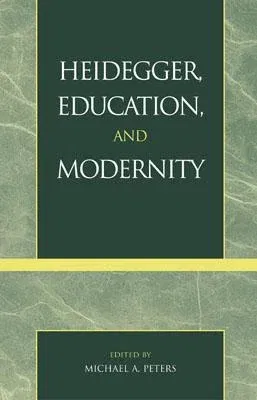Michael A Peters
(Author)Heidegger, Education, and ModernityPaperback, 1 August 2002

Qty
1
Turbo
Ships in 2 - 3 days
In Stock
Free Delivery
Cash on Delivery
15 Days
Free Returns
Secure Checkout

Print Length
288 pages
Language
English
Publisher
Rowman & Littlefield Publishers
Date Published
1 Aug 2002
ISBN-10
0742508870
ISBN-13
9780742508873
Description
Product Details
Author:
Book Format:
Paperback
Country of Origin:
US
Date Published:
1 August 2002
Dimensions:
22.61 x
15.37 x
1.45 cm
ISBN-10:
0742508870
ISBN-13:
9780742508873
Language:
English
Location:
Lanham, MD
Pages:
288
Publisher:
Weight:
349.27 gm